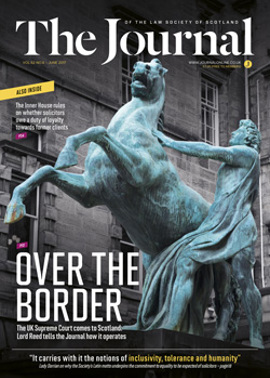Home grown

So far this year, the Scottish courts have issued two IP judgments.
Tartan Army v SETT GmbH
The pursuer owned certain UK and EU trade marks for the words “TARTAN ARMY”. The UK trade marks, registered in 1996-98, covered goods including clothing. The EU trade mark was registered with effect from 2006 for a broader range of goods and services including magazines and travel agency services. The pursuer’s activities under the brand included publishing a monthly newsletter and offering travel services.
The pursuer sought interdict and delivery up, alleging trade mark infringement and passing off; by the proof the action was only proceeding against the fourth defender, Alba Football Fans Ltd. Alba counterclaimed for invalidity of the trade marks, claiming inter alia that the “TARTAN ARMY” brand was not distinctive, and that the marks had not been used for all goods/services covered for five years.
Key points from the complex history are: In 1996-98 the pursuer’s predecessor, Ian Adie, began developing “TARTAN ARMY” as a brand. In 2005, the defender’s predecessor, SFM, contacted him to advise they planned to publish a fanzine, The Famous Tartan Army Magazine. Adie stated by email that he had “no issue” with SFM doing so.
After the pursuer acquired the UK trade marks and applied to register the EU trade mark, ramping up its branding efforts, it met SFM to discuss the magazine, without raising objection to it. In 2007, the pursuer became aware that SFM had been organising travel services under the “Tartan Army” brand. The pursuer objected to this and ultimately emailed, purporting to “withdraw any previous permission you had to use the registered trade mark ‘Tartan Army’ in connection with ‘The Famous Tartan Army Magazine’”. Letters before action were sent in August 2008.
SFM ceased trading in July 2008. By November 2008, its IP rights were assigned to Alba. Proceedings were raised in 2009, sisted until 2014, and came to proof in 2016, by which time the EU trade mark had lapsed insofar as relating to magazines and travel services.
Alba’s non-use challenge was upheld in part ([2017] CSOH 22), but the court held that the term “TARTAN ARMY” was inherently distinctive for the goods/services covered, though it was also used to describe the Scotland team’s fans. However, the trade marks had not been infringed by Alba and there was no passing off. The magazine name was similar to the trade marks, but not identical; likewise the goods/services. The pursuer had failed to prove a likelihood that the public would be confused into thinking that Alba’s goods and services were the pursuer’s. In addition, the claim under s 10(3) of the Trade Marks Act 1994 (and equivalent EU legislation), which protects trade marks with a reputation, failed as the pursuer failed to prove the marks had sufficient reputation. The passing-off claim failed as Alba was held to be making no misrepresentation to the public about the origin of its goods/services.
The court also considered whether the 2005 email amounted to a licence to use the trade mark on which Alba could rely, or alternatively whether the pursuer was personally barred by it from objecting to Alba’s acts, and held:
- The email gave permission to publish the magazine in future. However, this was impliedly revocable on reasonable notice. Alternatively, in terms of personal bar, the pursuer could change its position on reasonable notice.
- The pursuer was entitled to withdraw any previous consent given to use of the trade marks.
- Notice of termination was given in 2008. The case came to proof in 2016. On any view that was reasonable notice.
- In any event, the permission only extended to the magazine and not to other uses of the trade marks.
- Alba only acquired any rights after they had been terminated by the pursuer and in full knowledge of termination. It could not rely on personal bar as the permission was personal to its predecessor.
- Moreover, the 2005 email was interpreted as granting permission personally to the defender’s predecessor and the permission was not capable of assignation.
It is not uncommon for parties to fail to document IP licences/permissions properly, and this case highlights the risks and uncertainties that can result.
Although the case was factually complex, notably, the proof had only lasted four days due to the procedure adopted. Witness statements were used in place of evidence in chief, and documents were admitted into evidence without being spoken to. This is a good reminder of the procedural flexibility available under the Court of Session’s IP rules.
Mackie v Maxi Construction Ltd
This small claims action ([2017] SC LIV 11) related to copyright infringement resulting from the defender’s unauthorised use, on its website, of a photograph taken by the pursuer. Damages were sought based on the National Union of Journalists’ price guide for use of photographs online, plus additional damages in terms of s 97 of the Copyright, Designs and Patents Act 1988. The sheriff relied heavily on the Intellectual Property (Enforcement etc) Regulations 2006 and found that the pursuer had suffered no prejudice or negative economic consequences as a result of the defender’s use of the photograph. Nor had the defender made any unfair profits. Other relevant factors included that:
- the photograph was not displayed prominently on the defender’s website;
- the defender’s use was not a deliberate “theft” of the photograph;
- if the parties had negotiated a licence,
- the defender would probably have achieved a discount;
- there was witness evidence that the defenders could have obtained a photograph elsewhere for £65; and
- the pursuer’s initial email to the defenders was extremely aggressive, which was unreasonable.
Accordingly the sheriff awarded £750 instead of the £3,000 sought by the pursuer. The sheriff did not discuss any authorities relating to the regulations, and the case is of limited authority, but nevertheless is an interesting insight into how such cases are dealt with at small claims level.
In this issue
- Neutrality policies in commercial companies
- Court IT: the young lawyers' view
- Human rights: answering to the UN
- Galo and fair trial: which way for Scotland?
- Secondary victims in clinical negligence
- Reading for pleasure
- Opinion: Alan W Robertson
- Book reviews
- Profile
- President's column
- Twin tracks to completion
- People on the move
- Court of the nations
- Second time around
- How to avoid a summer tax scorcher
- Humani nihil alienum: a call to equality
- Sheriff commercial procedure: count 10
- Taking a pay cut: fair to refuse?
- Fine to park here?
- Enter the Bowen reforms
- Home grown
- Limited partnerships: a new breed
- Salvesen fallout: the latest round
- Gambling in football – the Scottish perspective
- Scottish Solicitors' Discipline Tribunal
- Changing sides
- Business drivers
- CCBE comes to Edinburgh
- "Find a solicitor" gets an upgrade
- Law reform roundup
- Thoughts on a frenetic year
- Check those bank instructions
- Fraud alert – ongoing bank frauds identified
- AML: sizing up the risk
- Master Policy Renewal: what you need to know
- Without prejudice
- What's the measure of a ruler?
- Ask Ash






